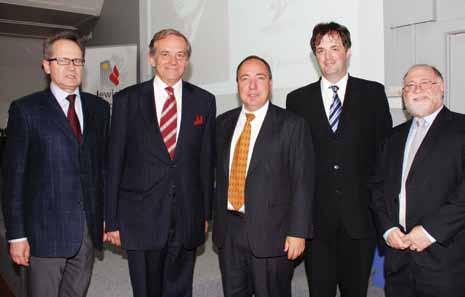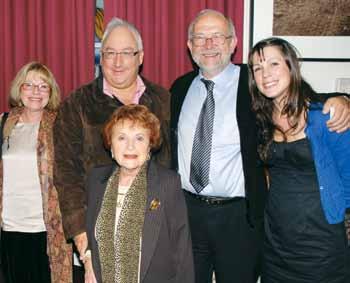
6 minute read
Henryk Slawik –the Polish Wallenberg
n October last year the Jewish Holocaust Centre (JHC) hosted an evening to honour Henryk Slawik , a Polish Gentile who saved thousands of Polish Jews residing in Hungary during the Holocaust The event was jointly sponsored by the embassies of Israel, Poland and Hungary.
Born in Szeraka, Poland in 1894, Slawik served as the head of the Civic Committee for Relief of Polish Refugees in Hungary, an agency of the Polish Government- inExile His humanity transcended nationality or creed: for him, care of abandoned refugees was an all - consuming concern Yad Vashem, which has acknowledged Slawik as one of the ‘Righteous Among the Nations’, recorded that Slawik rescued over 5,000 Jewish refugees living in Hungary between 1940 and 1944 . However, his close friend, Josef Antall Snr, placed the number of Jews Slawik rescued at approximately 15,000 Slawik was imprisoned by the Nazis soon after the Nazi take - over of Hungary in March 1944 He was tortured and transported to Mauthausen, where he was murdered
Advertisement
The evening’s program included the documentary Henryk Slawik – the Polish Wallenberg, and addresses by Mr Adam Warzel of the Australian Institute of Polish Affairs, His Excellency, Mr Andrzej Jaroszyńsky, Ambassador for the Republic of Poland, His Excellency, Mr Yuval Rotem, Ambassador for Israel and His Excellency, Mr Gábor Csaba, Ambassador for Hungary. Professor Jan Pakulski, President of the Australian Institute of Polish Affairs, proposed the vote of thanks .
The forgotten hero Adam Warzel
The most appropriate question one can ask about Henryk Slawik today is why, until recently, his name has remained almost totally forgotten Like the great Swede, Raoul Wallenberg, and the Japanese Vice - Consul to Lithuania, Chiune Sugihara, Slawik was one of the most important Righteous Among the Nations, but unlike them, he is relatively unknown.
Henryk Slawik was born in 1894 into a peasant family in Jastrzebie Zdroj, Upper Silesia, then part of Germany. He was a man of steely determination, self- discipline and organisational talents, an active member of the moderate wing of the Polish Socialist Party and editor of the newspaper The Worker’s Gazette
IWhen the war broke out, Slawik was mobilised into the Polish army. After the Soviet Union attacked Poland in September 1939, he crossed the border to Hungary. Thanks to his fluent command of German, he was spotted by Jozef Antall, a senior Hungarian government official responsible for organising aid for Polish refugees Slawik was brought to Budapest where he began organising the Citizens’ Committee for Helping Polish Refugees At the same time, he was clandestinely helping Poles exiled in Hungary to join the Polish Army being formed in France, and later in the Middle East He soon became the delegate of the Polish Government- in - Exile for Hungary
After the Hungarian government introduced racial laws, Slawik, in cooperation with Antall, began issuing thousands of Polish Jews with false documents confirming not only their Polish roots, but also their Roman Catholic faith. He also established an orphanage for Jewish children, named School for Children of Polish Officers, and helped disguise its true nature by having the children visited by Catholic Church authorities. Slawik was arrested by the Gestapo in July 1944. Before his arrest he went into hiding, but still managed to assist thousands of Polish Jews, and other refugees, to leave Hungary. Despite organising his family’s safe transit to Switzerland, he remained in Budapest to continue helping others. A month before his arrest, the Gestapo arrested his wife, Jadwiga, who was sent to Ravensbruck but survived.
During interrogation, Slawik showed rare valour and toughness, revealing nothing about his cooperation with his colleague and friend, Jozef Antall. Slawik was transported to Mauthausen concentration camp where he was executed during the second half of 1944. He remains, like Wallenberg, a hero without a grave.
Let me now go back to the original question – why has Henryk Slawik remained largely unknown until very recently? In my view there are a number of possible explanations:
Firstly, Slawik was an official of the London-based Polish Government-in-Exile. In post-war communist Poland, functionaries like Slawik were considered enemies of the state and their names were blacklisted. As a socialist from a moderate wing of the party, this in itself made him anathema to the post-war communist authorities.
Secondly, Slawik’s activities were conducted in a third country, Hungary. Like Poland, Hungary was also part of the Soviet bloc, so any attempt to uncover his deeds would naturally hit not one, but two walls.
The approach of the Polish communist authorities to the tragedy of the Shoah also tended to minimise it by making it part of general Polish suffering, a kind of ‘polonisation’ of the Holocaust. Consequently, the references made to six million Poles who perished during the war did not include the fact that half of this number – three million – were Jews. Auschwitz was a symbol of Polish, rather than Jewish, suffering, even though 90% of Poland’s pre-war Jewish population was murdered. No distinction was made between concentration camps, in which many Christian Poles were incarcerated, and death camps, used primarily for the annihilation of Jews. It is therefore little wonder that the collective memory controlled by the communist authorities left little place for revering people who devoted their lives to rescuing Jews.
Last but not least, is the international scene. Following the Six Day War of 1967, relations between Israel and the Soviet-bloc countries that supported the Arabs deteriorated markedly. Poland and others broke off diplomatic relations with Israel which were not fully restored until the winds of freedom swept Central Europe in 1989. As a consequence, contacts between historians of both countries were difficult and sporadic.
In this context it is not difficult to see that history was not only unkind to Henryk Slawik during his life, but also after his death.
Henryk Slawik’s name was saved from oblivion by the late Henryk Zvi Zimmerman and Grzegorz Lubczyk. Lubczyk served as Poland’s ambassador to Hungary between 1997 and 2001, where he developed a strong interest in Slawik, and Zimmerman was one of Slawik’s closest associates in Hungary. Zimmerman escaped from Hungary shortly before Slawik‘s arrest, settled in Palestine and later became a Member of the Knesset. It was Zimmermann who nominated Slawik to Yad Vashem as a Righteous Among the Nations, which was conferred in 1992.
Henryk Slawik: defying the silence of the masses Yuval Rotem

More than 70 years ago, the brutal atrocities that man inflicted upon his fellow man in the last century reached their apex in the cruel murder of six million Jews by the Nazi regime. The bitter irony is that the world saw, in plain view, the violence and destruction that Hitler was planning to inflict upon the Jews, and yet remained silent.
Rabbi Joachim Prince declared: ‘When I was the Rabbi of the Jewish community in Berlin under the Nazi regime, I learned many things. The most important thing that I learned is that bigotry and hatred are not the most urgent problem. The most urgent, the most disgraceful, the most shameful and the most tragic problem is silence.’
Silence allows those who abuse their power to continue to do so knowing that they will not be challenged. Unlike so many others, Henryk Slawik, a non-Jew, defied the silence of the masses and stood up for what was right and just. Today we pay tribute to his courage and salute his vision. He was truly a unique individual, whose legacy should be recognised and his powerful message embraced.
At a time when he could have done nothing, Henryk Slawik extended his hand to a humiliated and vulnerable people, using his position to provide thousands of refugees with false papers, in order to grant them new lives. His actions deserve to be commemorated – as Yad Vashem has done – precisely because it was at that time in history when voices needed to be heard the most.
Henryk Slawik’s message, that the convenience of silence is as evil as the greatest crime, is clear. However, the world still faces the same sort of battles that were fought decades ago. There are still voices that call for the destruction of our communities, large and small. Today, a leader of a nation denies the Holocaust, and calls for the destruction of the Jewish state, a mere seventy years after the beginning of Second World War. Today, he is welcomed by Heads of State in Europe, and is given a platform at the United Nations General Assembly in New York, yet again, from which to launch his verbal assault upon us all.
Today, the threats may be different, but their meaning is horribly familiar. And the importance of taking a stand is just as relevant today as it was when Henryk Slawik took upon himself the ultimate selflessness. His many acts of courage should never be forgotten. Nor should we forget the importance of speaking up for what is right. In this era of new threats, we cannot afford the luxury of inaction, indifference and silence. Now, more than ever, we must remember Henryk Slawik’s example.
We can all fulfil his legacy by following vigorously the ideal of the great philosopher and statesman, Edmund Burke, who over 200 years ago warned: ‘All that is necessary for evil to triumph is for good men to do nothing.’




